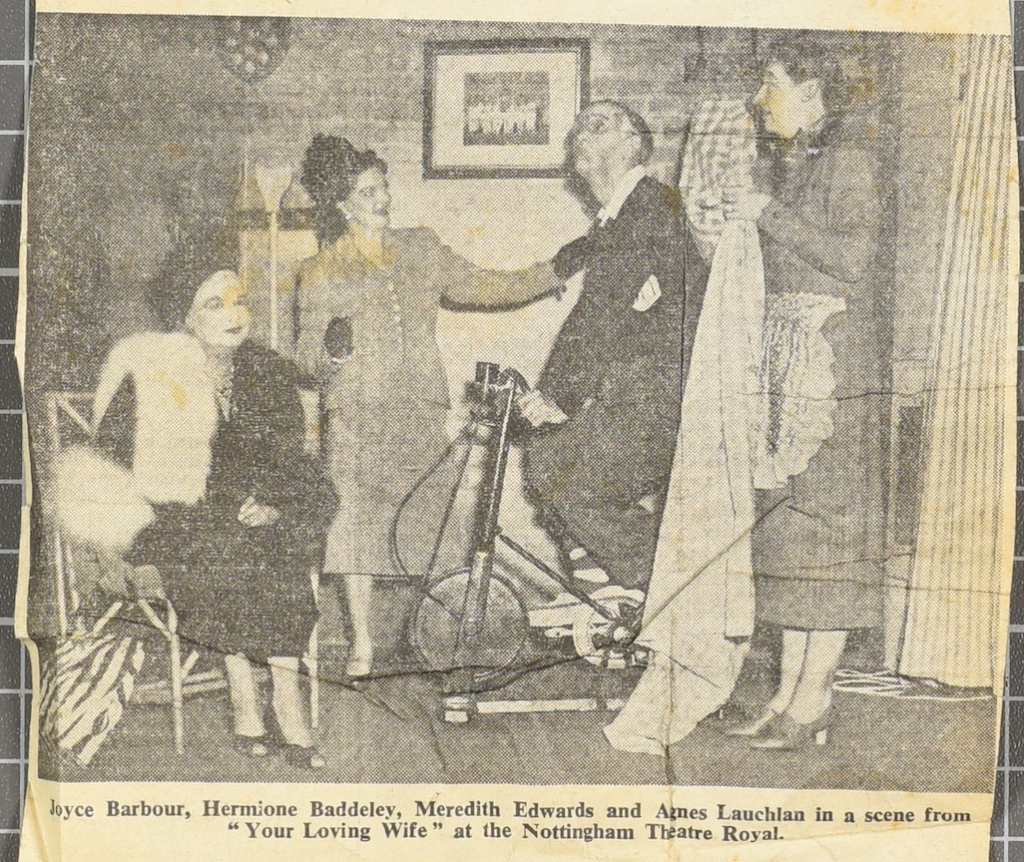I’ve managed to locate a reference to Your Loving Wife (the retitled and rewritten UK production of The Honeys) in the archive of The Guardian Journal from Nottingham. Many thanks to the North East Wales Archives, Ruthin Branch and the Meredith Edwards Papers collection for the cast photo, and thanks also to Oliver Houston for requesting access.
September 26, 1956
From Showpiece… by Emrys Bryson:
Applauded for her roles in such films as “Brighton Rock,” “It Always Rains on Sunday,” and “The Pickwick Papers,” Hermione Baddeley has, in “Your Loving Wife,” the chance to use all the tricks that have helped to make her famous—the sudden leer at the audience, the slightly abandoned air of craziness, the penchant for wicked satire. The play dodges round the domestic plots and stratagems of a couple of married women who long for a last fling before they are too old to bother about the pleasures of the world.
It is Roald Dahl’s first play. British by birth, he has lived for many years in America, where he has established himself in the front line of short-story writers with his appreciation of the ridiculous. When the last war broke out he was working for an oil company in Tanganyika. He drove 1,000 miles to Nairobi and joined the RAF, served in a fighter squadron in the Western Desert, was wounded, rejoined the unit in Greece and had to be invalided home.
It was when he was sent as assistant air attaché to the British Embassy in Washington that he began to write—mostly about flying. He is married to Patricia Neal, the actress who recently appeared on Broadway in Tennessee Williams’s “Cat on a Hot Tin Roof.”
Joyce Barbour—who plays the generous widow with a taste for travel and gin—is a former Gaiety Girl, her debut on the stage having been in the chorus of “To-night’s the Night.” Among her notable performances have been those as Madame Arcati in “Blithe Spirit” and Alice in the two-year run of “George and Margaret.” In the early part of her career she was in many of the famous musicals in London and New York. She has appeared with Hermione Badeley before—back in 1935 when she succeeded Hermione’s sister Angela in “The Greeks Have a Word for It.” Her most recent West End show was “Jubilee Girl,” which was in Nottingham in April.
Completing the trio of women in the cast is Agnes Lauchlan, straight from her success in Angus Wilson’s “The Mulberry Bush” at the Royal Court. She started her career in a walking-on part in the 1924 production of “St. Joan,” in which Dame Sybil Thorndike played Joan, and has since been in almost every type of show from Shakespeare to Coward. Last year she led the Pitlochry Festival company in five plays. She has managed lately to combine her two hobbies—writing and dogs—by publishing an anthology called “A Dog at All Things.”
In the twin roles of the husbands who get in the way of the final feminine fling is Meredith Edwards, a Welshman who was a laboratory assistant until he joined the Welsh Theatre Company in 1938. His films include “A Run for Your Money,” “Where No Vultures Fly,” “The Blue Lamp” and “The Long Arm.” He was with the Old Vic company this season and spoke the commentary to the film “The Conquest of Everest.”
October 2, 1956
Hermione Baddeley may have a comedy winner
WHEN her husband has been good enough to pass from this world, the least a wife can do is to let a decent interval elapse before the celebrations begin.
That is the theory, at any rate, but in practice the merry widows-to-be in “Your Loving Wife” at the Nottingham Theatre Royal cannot wait to book that suite on “A”-deck for a Mediterranean cruise after their husbands’ demise. It is just bad luck that one of the spouses manages to cling tenaciously to life.
A strange thing about Nottingham audiences is their reluctance to attend a new show which has not had the seal of approval from London. On many occasions the Royal has been half empty for shows—usually with “big names” too—which are making a trial run in the provinces before going to the West End, and which ultimately prove record-breakers.
In this new comedy by the American short story writer Roald Dahl, to be presented in London in about a month’s time, we have the chance to laugh before London at what should be a tidy little winner.
With a kind of young “Arsenic and Old Lace” quality of madness about it, it deals with the gradual dawning on two long-married women that if their stodgy, querulous husbands were out of the way they would be able to enjoy a final fling while they have the wind to do it. One is married to a health faddist—trotting electrically on a mechanical horse in the rumpus room, sitting on his air ring, and gulping his tranquilliser tablets. The other to a grumbly old judge with a “thing” about bagging (in the safety of the auction rooms) various animals’ heads to hang on the walls.
Like well-dressed versions of Gert and Daisy, the two women gossip about various modes of exit, and in the course of the evening toy with methods which include steaming by Turkish bath, concussion by leg of lamb, and poison by tiger’s whiskers chopped up small and stirred into a glass of medicine.
Hermione Baddeley is back as the more contented of the two, with her gravelly inflection and air of abandoned craziness. She would be even better if she refrained from “pointing” her reactions in already bizarre situations, but she still has that delicious way of putting an underlying meaning into a straightforward line.
Agnes Lauchlan is a good partner as the rather fluttery Mary whose husband is “removed” first, and Joyce Barbour sweeps around in furs and “cultoor,” wonderfully blossoming into a hard-spending gadfly.
Meredith Edwards, a Welsh actor whom we know from films like “The Blue Lamp,” and “The Long Arm,” shuffles through in bemused fear of his life as both husbands, and at one period performs the illusion of being on the stage with himself, a minor point to a man of his talents.
If producer Gerald Savory tautens the action, strengthens the ending, and deletes one or two of the off-colour references, the trick is done.

